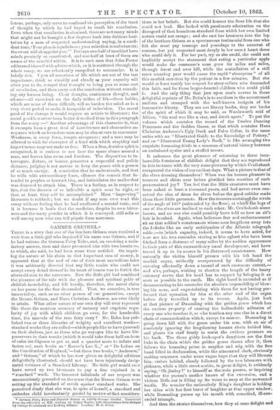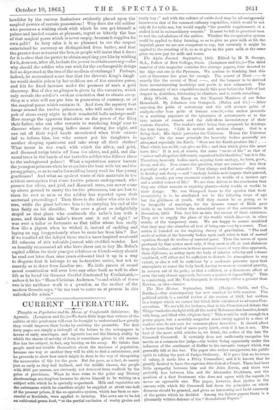GAMMER GRETHEL.*
THERE is a story that one of the brothers Grimm once received a visit from a little girl who inquired if his name was Grimm, and if he had written the German Fairy 'rules, and, on receiving a satis- factory answer, then and there presented him with two kreutzers, to which, she said, he had been some time entitled. On inquir- ing the nature of his claim to that important sum of money, it appeared that at the end of one of their most marvellous tales it was arbitrarily directed that any little reader who could not accept every detail thereof in its heart of hearts was to forfeit the aforesaid sum to the narrators. Now the little girl had combined the pleasure of the tale with the pleasure and spiritual pride of childish incredulity, and felt keenly, therefore, the moral claim on her purse for the fiuo demanded. That, we conceive, is true immortality, such as no other person of cur generation, except the Messrs. Grimm, and Hans Christian Andersen, are ever likely to attain. What other names of our own day will ever represent like these the anxious accuracy of memory and exquisite regu- larity of joy with which children go over, for the hundredth time, the marvels of the true fairy story ? Mr. Bohn has pub- lished two or three libraries of weighty and excellent works— standard works they are called—which people like to have (unread) on their shelves, just as those who go voyages like to have life- preservers in their trunks (which it would take them half-an-hour of calm intelligence to get at, and a quarter more to inflate and fasten on), such books as " Roscoe's Leo X.," or " De Lolme on the Constitution of England,"—but these two books, " Andersen," and*" Grimm," of which he has now given us delightful editions delightfully illustrated, should not have been injuriously desig- nated volumes of a Standard -Library. No little girl would ever have saved up two kreutzers to pay a fine enjoined in a " standard " work. The innocent infinitude of ner respect was unconsciously grounded on the sense that the Messrs.-Grimm were setting up the standard of revolt against standard works. She perceived dimly that she was, in spite of herself, a standard and orthodox child involuntarily guided by matter-of-fact considers- • German Fairy Tales and Popular Stories as told by (haunter Grethel. Translated from the collecdon of MM. Grimm by Edgar Taylor, with illustrations from designs by George Cruikshank and Ludwig Grimm. London : A. G. Bobo.
tions in her beliefs. But she could honour the freer life that•she could not lead. She looked with passionate admiration on the disregard of that humdrum standard from which her own limited nature could not escape ; and she cast her kreutzers into the lap of the brothers Grimm as a spontaneous testimonial from one who felt she must pay tonnage and poundage to the autocrat of custom, but yet respected most deeply in her secret heart those who could defy it. For her part, try as she could, she could not implicitly accept the statement that eating a particular apple would snake the consumer's nose grow for miles and miles, through forest and over hill, while the assimilation of a still more amazing pear would cause the rapid absorption " of all this morbid secretion by the patient in a few minutes. But she would at least testify her respect for story-tellers who demanded this faith, and for those larger-hearted children who could yield it. And the only thing that jars upon one's nerves in these delightful reprints of Mr. Bohn's is to see them in the accustomed uniform and stamped with the well-known insignia of his instructive library. They are Dot library books, they are hooks of the spirit of which it may be said, as Wordsworth said of "his soul was like a star, and dwelt apart." To put the volume which contains the record of the Twelve Dancing Princesses and the Golden Goose, or that which contains Haus Christian Andersen's Ugly Duck and False Collar, in the same series with an "Illustrated Guide to the Knowledge of Pottery," and an " Illustrated Young Lady's Book," is like arranging two exquisite humming-birds in a museum of natural history between an embaltned oyster and a stuffed mouse.
It enhances the great pleasure of returning to these inex- haustible fountains of childish delight that they are reproduced in this instance with the very same pictures by which Cruikshank enraptured the vision of our earliest days. *What a picture is that of the elves dressing themselves! When was the human pleasure in trousers and shirts ever before glorified into emotion of such preternatural joy? You feel that the little creatures must have been naked at least a thousand years, and had never even con- ceived the idea of dress for elves before the good cobbler made them these little garments. How the trousers sustained the strain of the angle of 195° (subtended by the floor), at which the legs of one of the elves are inclined to each other, Mr. Cruikshank alone knows, and no one else could possibly have told us how an elf's hair is brushed. Again, what ludicrous fear and embarrassment sit on that soldier's countenance whose nose lengthens away into the Infinite like an early anticipation of the Atlantic telegraph cable ; —in ;which capacity, indeed, it seems to have acted, for here are his two comrades staring at hint aghast who have been fetched from a distance of many miles by the sudden appearance in their path of this extraordinary nasal development, and have traced it up to its source in his distressed countenance. How naturally the victim himself presses with his left hand the morbid organ, evidently overpowered by the difficulty of sneezing effectually down a tunnel of such enormous extent,— and els.), perhaps, wishing to shorten the length of the heavy catenary curve that his head has to support by bringing it as soon as possible to the earth. His right hand is extended as if demonstrating to his comrades the absolute impossibility of blow- ing his nose, and expostulating with them for not having per-. formed that operation for him at the other end of the organ before they travelled up to its source. Agaiu, just look at that picture of Dummling with the golden goose which has the curious property of causing the indissoluble adhesion of every one who touches it, or who touches any one else in a direct chain of communication with it, except its master. Dummling is going down hill with the goose under his arm, with an air of resolutely ignoring the lengthening human chain behind him, and plants his staff firmly to resist the evident pressure on his back. The three giddy innkeeper's daughters are the first links in the chain which the golden goose draws after it, then follows the bouncing priest in surplice and wig, with the free hand ,lifted in declamation, while the attenuated clerk, obviously making responses tinder some vague hope that they will liberate him, rushes behind, closely followed by the two labourers with pickaxes, while a little street urchin, in great delight, is evidently saying, "Oh jiminy 1" to himself as the train passes, or inquiring whether the parson's mother knows of the excursion, and a vicious little cur is lifting up its voice to snap at the unwonted bustle. No wonderthe melancholy King's daughter is holding her sides with her first burst of laughter at that upper window, while Dummling purses up his mouth with conceited, ill-con- cealed triumph.
And then the stories, themselves, how they at once delight and
bewilder by the curious limitations evidently placed upon the magical powers of certain possessions! Why does the old soldier who possesses a wishing cloak with which he can get himself a palace and lauded estates at pleasure, regret so bitterly the loss of that magical purse which is never empty, because it supplies its own gold? In fairy tales it is so pleasant to see the respect entertained for currency as distinguished from barter, and that the greater does notcover the less, as people will insist that it does; for it is clear that the power to obtain anything you like by wishing for it, does not, after all, include the power to obtain currency—else why should the soldier who can wish for the exchangeable things feel BO depressed at the loss of the medium of exchange ? Perhaps, indeed, he entertained some fear that the thievish King's daugh ter would double prices by her reckless use of the creative purse, and felt for fixed incomes under -the pressure of such a gold discovery. But of this no glimpse is given by the narrative, which only reveals the soldier's evident conviction that to obtain every- thing at a wish will not put him in possession of currency, or of the magical purse which contains it. And then the mystery that bangs around the twelve princesses, who will each wear out a pair of shoes every night in their wonderful balls underground! How strange the apparent limitation on the power of the King their father, who can offer rewards to wandering kings' sons to discover where the young ladies dance during the night, and can cut off their royal heads unmolested when their owners fail to inform him, but -who cannot put his daughters in another sleeping apartment and take away all their clothes! What terror iu the crash with which the silver, and gold, and diamond twigs broke off from the silver, and gold, and dia- mond trees in the hands of the invisible soldier who follows them to the underground palace ! What a mysterious sorrow haunts the youngest princess when he steps into the boat with her and the young prince, so as to make the sculling heavy work for that young gentleman ! And what an opulent waste of rich materials in the evident assumption that those twelve princes underground, who possess the silver, and gold, and diamond trees, can never come up above ground to marry the twelve princesses, but are lost to them for ever so 130311 as the soldier has reported upon their nocturnal proceedings ! Then there is the tailor who sits in the tree, while the giant believes him to be carrying his cud of the tree fairly on his shoulder. Was ever a giant so delightfully stupid as that giant who confounds the tailor's hen with a stone, and thinks the tailor's throw sent it out of sight ? or was ever a tailor so fortunate as that tailor whose hen really flew like a pigeon when be wished it, instead of cackling and laying an egg inopportunely when lie casts her from him ? But if we recalled all the delight these stories have inspired we should fill columns of this valuable journal with childish wonder. Let us heartily recommend all who have them not to buy Mr. Bohn's capital edition for their younger relations or friends—they should be read not later than nine years old—and bind it up in a way to disguise that it belongs to an instructive series, but not so smartly as to deter from familiar use. No little person of sound moral constitution will ever love any other book as well in after life as he loved his Gammer Grethel illustrated by Cruikshank,— unless it be his " Hans Christian Andersen,"—and which of those two is the sublimer work is a question, as the mother of the modern Gracchi says, " far too vast to enter on at present iu this unlooked-for crisis."































 Previous page
Previous page